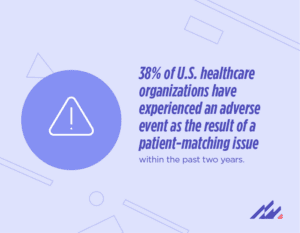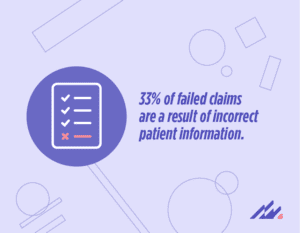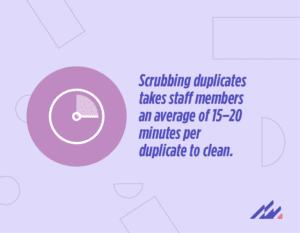Article
The dangers of disparate systems
Imagine a patient involved in a car accident is brought to your Emergency Department. Once they’re stabilized, they’re assigned a regular bed within the hospital. While there, a complication arises and they need emergency surgery. Afterwards, they’re sent to a surgical ICU to recover. Eventually the patient is well enough to be released to a step-down unit, then back to a regular hospital bed before finally being discharged. But the ordeal doesn’t end there; perhaps they will need to return to your organization for physical therapy, reconstructive surgery or pain management.
For each step along this patient’s journey, their data has made an equally complex journey across a tapestry of disparate systems during their hospital stay, leaving room for miscommunication and mistakes. Today, we’re going to take a closer look at the dangers of keeping disparate systems within an organization and explore a solution to this problem that plagues many organizations across the country.
Clinical
 Let’s start with the most obvious: patient safety. If you have multiple patients with the same name (or even names that are extremely similar), your staff members are running the risk of selecting the wrong patient record. This can create one of two issues:
Let’s start with the most obvious: patient safety. If you have multiple patients with the same name (or even names that are extremely similar), your staff members are running the risk of selecting the wrong patient record. This can create one of two issues:
1. Wrong-patient errors, in which one patient’s record contains information that is mixed with another patient’s information.
2. Duplicate patient errors, where a single patient’s information is associated with more than one matchable entity.
In a 2019 survey of healthcare providers and Health Information Exchanges (HIEs), close to 38% of U.S. healthcare organizations surveyed had experienced an adverse event as the result of a patient-matching issue within the past two years.
Financial
 On the backend, when it’s time to bill a patient for their stay, selecting the wrong patient record presents a different risk. Selecting (and therefore billing) the wrong patient record leads to denied claims, costing your organization millions of dollars in lost revenue. That isn’t an exaggeration. According interoperability-congruently-increasing-patient-20426295″>to one study by Black Book, an estimated 33% of failed claims are a result of incorrect patient information, costing hospitals an average of $1.5M a year. Missing this revenue is particularly harmful to rural organizations, where low patient volume already creates a financial hurdle.
On the backend, when it’s time to bill a patient for their stay, selecting the wrong patient record presents a different risk. Selecting (and therefore billing) the wrong patient record leads to denied claims, costing your organization millions of dollars in lost revenue. That isn’t an exaggeration. According interoperability-congruently-increasing-patient-20426295″>to one study by Black Book, an estimated 33% of failed claims are a result of incorrect patient information, costing hospitals an average of $1.5M a year. Missing this revenue is particularly harmful to rural organizations, where low patient volume already creates a financial hurdle.
Operational
 Finally, there’s the cost of reworking claims. Your staff has to spend their valuable time and energy correcting failed claims. You could ask them to sort through your patient files manually, but with most healthcare organizations suffering from staffing shortages, it’s more vital than ever to use staff in the most efficient way possible. Scrubbing duplicates takes staff members an average of 15–20 minutes per duplicate to clean. (Not to mention, the American Health Information Management Association reports that average cost to rework a claim is $25–181 per claim.) So, if just one patient has three duplicates, your staff member just spent an hour cleaning up the files of just one patient. There has to be a better way.
Finally, there’s the cost of reworking claims. Your staff has to spend their valuable time and energy correcting failed claims. You could ask them to sort through your patient files manually, but with most healthcare organizations suffering from staffing shortages, it’s more vital than ever to use staff in the most efficient way possible. Scrubbing duplicates takes staff members an average of 15–20 minutes per duplicate to clean. (Not to mention, the American Health Information Management Association reports that average cost to rework a claim is $25–181 per claim.) So, if just one patient has three duplicates, your staff member just spent an hour cleaning up the files of just one patient. There has to be a better way.
What can organizations do?
To avoid these issues, organizations can use what is known as an Enterprise Master Person Index (EMPI). This type of solution assigns a unique identifier to each patient that acts as a “glue” between disparate systems within an organization, ensuring the correct patient file is used and billed. EMPIs promote accurate identification across all solutions while maintaining data integrity, improve an organization’s interoperability and serve as a message broker between systems.
At Altera Digital Health, I’m proud to work on our version of EMPI, Ventus Passport. One Altera client was able to use Passport to identify that 56% of its 203,347 patient records were duplicates. To correct that manually, it would have required approximately 14 full-time employees to work on nothing but cleanup for an entire year! I’m excited to continue our work with this client and many others because EMPI solutions like Passport can truly make a huge difference toward achieving financial stability and improving your organization’s productivity and efficiency.
To learn more about EMPI solutions, go here.













